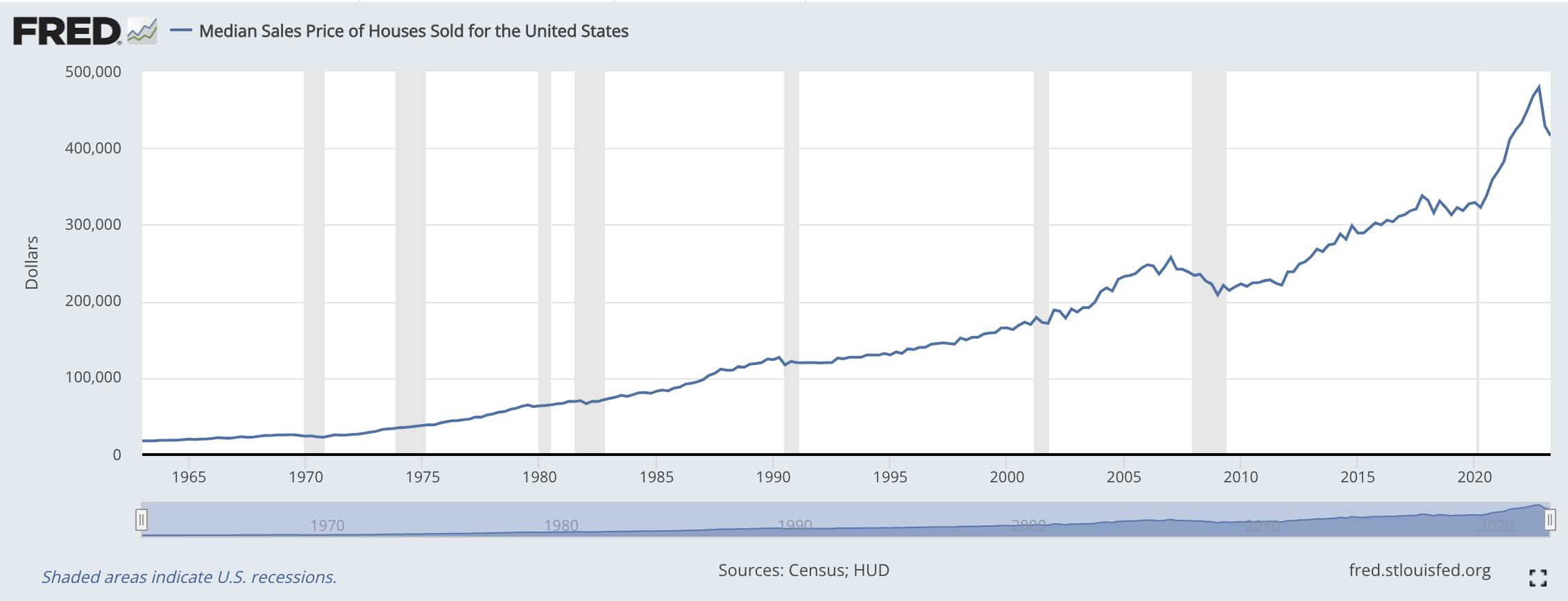The Evolution of the Housing Market: A Historical Perspective
Median Sale Price of Houses Sold (1960-2023)
The history of the housing market is a fascinating journey through economic shifts, societal changes, and innovative trends. Over the years, this ever-evolving market has played a pivotal role in shaping the way we live, invest, and build communities. Join us as we take a guided tour through the rich tapestry of the housing market’s past, offering insights into its transformation and the importance of staying ahead in this dynamic realm.
- Early Beginnings: The origins of the housing market can be traced back to ancient civilizations, where people settled and constructed dwellings. In Mesopotamia and ancient Egypt, the concept of property ownership and the exchange of real estate started to emerge. These early transactions laid the groundwork for future real estate markets.
- Feudalism and Manor Houses: During the medieval period, landownership was dominated by feudalism. Manor houses and vast estates were prevalent, and property rights were often tied to loyalty to a lord. The concept of home and property began to evolve as these structures formed the basis of a feudal society.
- Industrial Revolution and Urbanization: The 19th century witnessed the transformative effects of the Industrial Revolution. The shift from agrarian to industrial societies led to increased urbanization. As people flocked to cities for work, the demand for urban housing soared, giving rise to the modern concept of city real estate.
- The Great Depression and Suburbanization: The housing market experienced a significant setback during the Great Depression, but it bounced back with vigor during the post-World War II era. Suburbanization became a defining trend, as affordable housing options outside of major cities became widely available, paving the way for suburban communities.
- The Housing Bubble and Burst: The late 20th and early 21st centuries brought both prosperity and turmoil. The housing bubble of the mid-2000s, marked by excessive lending and speculation, ultimately burst, triggering a global financial crisis. This event underscored the importance of responsible lending and the need for robust regulations.
- The Digital Age and Real Estate Technology: With the advent of the internet and technological advancements, the housing market has seen a fundamental shift. Online listings, virtual tours, and data-driven insights have made the buying and selling of homes more accessible and transparent.
- Sustainability and Green Building: In recent years, there has been a growing emphasis on sustainability and green building practices. Energy-efficient homes, eco-friendly materials, and sustainable communities are becoming essential elements of the housing market, reflecting a broader societal shift towards environmental consciousness.
- The Future of the Housing Market: As we look to the future, the housing market is expected to continue evolving. Trends such as smart homes, shared ownership models, and alternative housing arrangements are shaping the market. Additionally, addressing housing affordability and accessibility is becoming an increasingly pressing concern.
Conclusion: The history of the housing market is a tale of resilience, adaptability, and progress. It has weathered economic storms, embraced technological advancements, and adapted to changing societal values. Understanding this history is essential for those navigating the complexities of the modern housing market, where innovation and responsible practices are keys to success.

